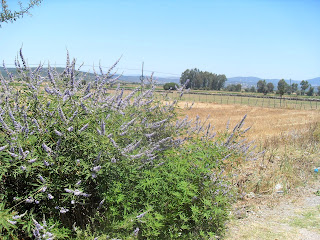If you have travelled out of town anywhere in South West Turkey you will have driven past this bush. It's spike-like blooms can be any shade from pale lilac to a deep purple and it's always buzzing with bees and butterflies. In the villages around Milas, its green leaves are boiled up to dye the skeins of wool for the carpets that are still woven in almost every household. Its branches were used to make baskets, but I haven't been able to find anyone still doing this. The leaves can be macerated in oil to make an insect repellant. I should try it on my ant infestation. Its many names; Chasteberry, The Chaste tree, Abraham's Balm and Monk's Pepper refer to its ancient use as a libido inhibitor. Roman women were said to spread it on beds while their husband's were away on campaigns and monks used it to keep their thoughts pure. Research in Germany has proved that this plant, while containing no hormones itself, has a balancing effect on the body's endocrine system. Taken either dried in capsules or as a tincture every morning, it has been found to reduce the adverse symptoms of polycystic ovaries, p.m.s. and menopause. I discovered it about 10 years ago when I lived in England and I bought my supply from Hambly's Herbal Dispensary in East Sussex http://www.hamblys.net/ . I recommend my female readers take a look at the website. It took me several years to realise that the main ingredient of the precious little bottle was growing in abundance at the bottom of my garden. So this Autumn I will be out with my basket harvesting my own berries.
Monday, 2 July 2012
Agnus Castus
If you have travelled out of town anywhere in South West Turkey you will have driven past this bush. It's spike-like blooms can be any shade from pale lilac to a deep purple and it's always buzzing with bees and butterflies. In the villages around Milas, its green leaves are boiled up to dye the skeins of wool for the carpets that are still woven in almost every household. Its branches were used to make baskets, but I haven't been able to find anyone still doing this. The leaves can be macerated in oil to make an insect repellant. I should try it on my ant infestation. Its many names; Chasteberry, The Chaste tree, Abraham's Balm and Monk's Pepper refer to its ancient use as a libido inhibitor. Roman women were said to spread it on beds while their husband's were away on campaigns and monks used it to keep their thoughts pure. Research in Germany has proved that this plant, while containing no hormones itself, has a balancing effect on the body's endocrine system. Taken either dried in capsules or as a tincture every morning, it has been found to reduce the adverse symptoms of polycystic ovaries, p.m.s. and menopause. I discovered it about 10 years ago when I lived in England and I bought my supply from Hambly's Herbal Dispensary in East Sussex http://www.hamblys.net/ . I recommend my female readers take a look at the website. It took me several years to realise that the main ingredient of the precious little bottle was growing in abundance at the bottom of my garden. So this Autumn I will be out with my basket harvesting my own berries.
Subscribe to:
Post Comments (Atom)





Very interesting bush.....I don't think I ever noticed it before. Will look now when I go. Thanks for the info....always something new I learned.I should try if it has a balancing effect on the body's endocrine system....b/c I have thyroid problems. Well I don't have anymore b/c I had it out ......due to some medical issues.
ReplyDeleteThanks for posting this.....the info was very helpful. :-)
This comment has been removed by the author.
ReplyDelete. . a splendid medicinal plant - Chaste Tree being its most common name - a few men of the cloth should find it preferable to castration!!!
ReplyDeleteJudging by the number of teenage mothers I see here the government should start putting it in the school meals...
ReplyDeleteIt is wonderful that people use almost all the different parts of the plant to make it into useful things. I'm not sure if we have this in Singapore.
ReplyDeleteHmmm. I don't think I've seen it but from your photo, the flowers look like sage and the leaves almost look like an illegal herb. Do the leaves have an aroma when rubbed?
ReplyDeleteThis is amazing blog,i never had seen earlier this type of article which contain lots of important information...
ReplyDelete